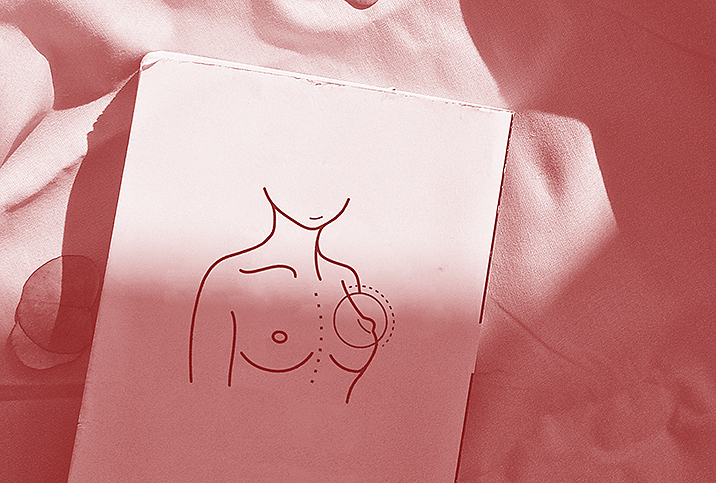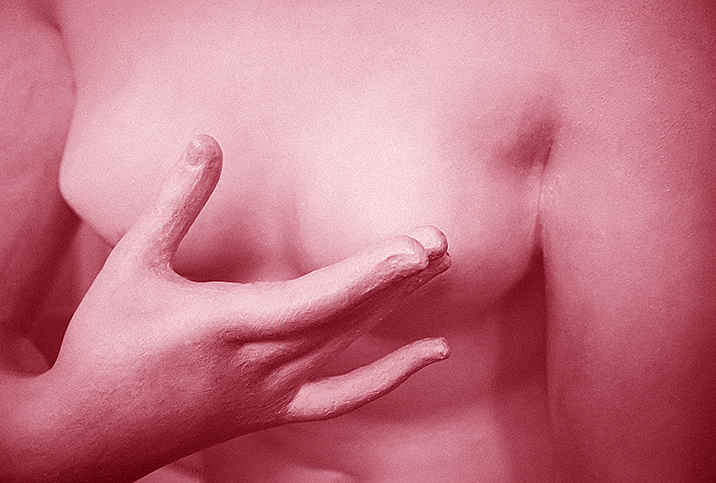Are These Breast Cancer Rumors True?

We have all heard rumors about the various things that can supposedly cause breast cancer. There is so much information on the internet these days, and it's difficult to sort fact from fiction. However, it is crucial to be correctly informed so you can make the best decisions for your health. Prevention and early detection are the best ways to beat the disease.
We consulted with Jason Sager, M.D., CEO and president of Sagely Health, and Constance M. Chen, M.D., M.P.H., FACS, board-certified plastic surgeon and breast reconstruction specialist, to set the record straight.
Using an antiperspirant
According to the National Cancer Institute, there is no scientific evidence linking antiperspirant use to breast cancer, and Chen agreed the supporting evidence is lacking for this internet rumor. Sager pointed out, however, that the two primary studies that have looked into this relationship were performed in 2002 and 2003, and not much research has been done since.
Avoiding harsh or artificial chemicals is a general recommendation when putting something on or in your body.
Because most people use an antiperspirant, it's difficult to know if its use may contribute to breast cancer. We do know that aluminum compounds, often found in antiperspirants and used to block sweat from leaving your sweat glands, have been shown to increase estrogen levels. Estrogen dominance has a proven track record for increasing cancer cell production.
Sager suggested that for those who may be concerned, avoiding harsh or artificial chemicals is a general recommendation when putting something on or in your body. Today, there are enough products to select from to avoid such chemicals if so desired.
Wearing a bra to bed
For some women, particularly those with larger breasts, wearing a bra to bed can often be more comfortable. However, rumors abound that wearing a bra to bed can increase your risk for breast cancer.
"I do not believe there is any harm in wearing a bra as it pertains to breast cancer for longer periods, or even to bed. It is acceptable for women who have larger breasts to keep a bra on 99 percent of the time for more support and comfort," said Chen.
Sager referenced a study published in 2014 showing no relationship between wearing a bra and developing breast cancer. Other factors—such as cup size, a bra containing underwire, the length of time spent wearing a bra in a day, and the age at which a bra was first worn—had no link to the development of breast cancer.
People who are concerned might find a suitable alternative. In general, avoiding long-term inflammation is always a good recommendation, so look for a comfortable bra that doesn't irritate when worn overnight or for hours on end. Make yourselves comfortable, ladies!
Protein shakes
High-protein diets are trendy these days, but it's also rumored that a high-protein diet, or one that includes protein shakes or supplements, may cause certain kinds of cancer, including breast cancer. A protein-rich diet has many advantages, but you must choose your sources of protein wisely. Protein shakes, particularly ones available through multilevel marketing, may contain cancer-causing or barely tested ingredients.
There are many plant-based protein shakes on the market that contain organic ingredients. If you're working out and need the extra protein, it's essential to know the ingredients in your supplements. According to Harvard Health, it is better to get your protein from healthy sources, such as low-fat dairy products, fish, nuts, beans, lean chicken and turkey.
A protein-rich diet has many advantages, but you must choose your sources of protein wisely.
Sager emphasized again that it is best to avoid harsh or artificial chemicals when putting something in your body. Chen pointed out that most cancer cells are glucose-dependent, and there is a belief that a plant-based diet helps lower the risk of cancer. Additionally, there is some evidence that high-sugar diets, meats, fatty foods and such can put people at higher risk of cancer in general.
Educate yourself on the ingredients in the protein shakes or supplements you're considering, and check with your doctor if you're unsure.
Using your cell phone
"Cell phones emit non-ionizing radiation, and there is currently no consistent evidence that cell phone radiation increases cancer risk," said Chen.
There are many problems with the overuse of cell phones, but cancer is not one of the obvious ones, according to Sager. It's worth noting that the correlation between cell phone usage and cancer has been studied extensively, with conflicting results. The Centers for Disease Control and Prevention (CDC) concluded more research is needed.
That said, for those concerned, minimize your cell phone use. However, be sure to enjoy the many benefits it brings for mindfulness and health beyond cancer.
An abundance of sugar
Chen mentioned that sugar can feed cancer cells, so it is possible that limiting sugar can lower the risk of breast cancer, though there is currently no scientific evidence that sugar itself causes breast cancer. However, obesity can cause many health problems. Making better dietary choices and exercising regularly are huge but rewarding life changes.
Consult your doctor before starting any new weight loss routine or before making any significant dietary restrictions. Sager noted that eating a healthy, well-balanced diet without processed sugars will benefit your health in many ways, including the possibility of reducing the risk of cancer.
Aging
Getting older puts you at a higher risk for developing breast cancer, but breast cancer doesn't only affect older women. Men and younger women are also at risk for developing the disease. "Many elements are responsible for breast cancer, and the primary factors will be different for every breast cancer patient," Chen said.
Younger women who carry the BRCA 1 or BRCA 2 gene mutation or have close relatives (mother, father, siblings) who have had breast cancer are at a much higher risk and may need to begin mammograms before age 40.
According to Sager, about 1 in 500 women have mutations in a BRCA gene, and about half of those women develop breast cancer and have a high risk of developing ovarian cancer. Know your risks and talk to your doctor. Genetic testing can help you learn more if you do not know your family history.
Mammograms
A final pesky rumor we want to address is mammograms. A common misconception is that the dose of radiation in a mammogram can cause breast cancer.
We are happy to say we confirmed with both Sager and Chen who stated you cannot get breast cancer from mammograms. Sager added that the amount of radiation received during a mammogram is less than what you'd get flying in an airplane for four hours. Never getting a mammogram, and therefore being uninformed about your health, places you at a much higher risk of dying from breast cancer.
Early detection is key
If you are unsure if you are at high risk or if you're over the age of 40, talk to your doctor now. Early detection is the key to prevention and cancer survival.
Sagar stressed that genetic testing and advanced imaging technology are readily available today. If you have a family history of breast cancer, it can be of great benefit to explore your risk earlier rather than later.
While the guidelines vary by organization, performing consistent breast self-exams, along with doctor-performed breast exams, can keep you informed on what your breasts normally feel like, so it's easier to tell when something is wrong.
About 1 in 500 women have mutations in a BRCA gene, and about half of those women develop breast cancer and have a high risk of developing ovarian cancer.
Watch out for unusual lump(s) in the breast or armpit, chronic (more than a month) irritation of the breast, new dimpling in a breast, chronic red or flaky skin around a nipple, pulling in or pain around a nipple, nipple discharge, pain, or change in the size or shape of the breast (not having to do with a pregnancy, of course). While these won't necessarily lead to a cancer diagnosis, it is a good idea to check with your doctor if they occur.
According to Chen, men and women at risk for developing breast cancer should undergo routine exams so they can catch breast cancer early. They should start regular monitoring 10 years earlier than the age at which their first-degree relative was diagnosed with breast cancer, and need to undergo an exam every six months instead of every year. They should become familiar with the shape and feel of their breasts to alert their doctor to any of the changes mentioned above.
There is a lot of misinformation out there about breast cancer and what can cause it. If you find yourself going down a rabbit hole of potential cancer causes, don't panic—talk to your doctor. They will be able to help differentiate myth from reality and ease your worries.


















